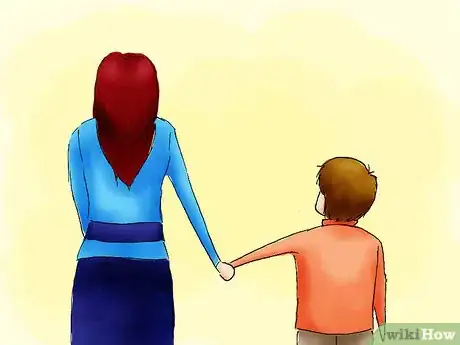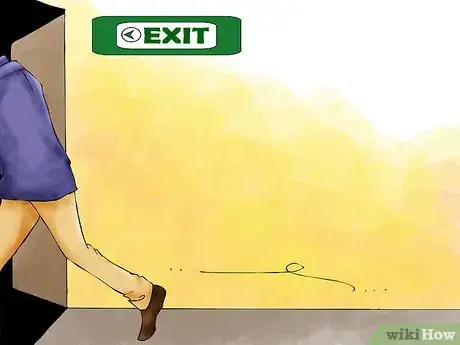This article was co-authored by Liana Georgoulis, PsyD. Dr. Liana Georgoulis is a Licensed Clinical Psychologist with over 10 years of experience, and is now the Clinical Director at Coast Psychological Services in Los Angeles, California. She received her Doctor of Psychology from Pepperdine University in 2009. Her practice provides cognitive behavioral therapy and other evidence-based therapies for adolescents, adults, and couples.
There are 8 references cited in this article, which can be found at the bottom of the page.
wikiHow marks an article as reader-approved once it receives enough positive feedback. This article received 12 testimonials and 92% of readers who voted found it helpful, earning it our reader-approved status.
This article has been viewed 288,347 times.
Are you being raised or were raised by a mother who seems to think only of her needs before yours? Whether she realizes it or not, a narcissistic mother can cause tremendous damage to a child’s self worth and self esteem, not to mention the fact that many of your needs may not be met. Despite being hurt by your self-centered mother, you can overcome her emotionally absent behavior and develop into a strong, caring individual.
Steps
-
1Acknowledge and grieve the loss of never having a true mother. A real mother puts her child’s physical and emotional needs above her own, however if you’ve lived or are currently living with a narcissistic mother, her needs must be met first.[1]
- Don’t try to figure out why. In some cases your mother was the victim of a narcissistic parent herself or another kind of abuse. In other cases, perhaps, your mother never really “grew up” and hasn’t realized that the world has many more people than her. Either way, this situation is not your fault.[2]
- Try not to ponder “what if I had a better mom?” Instead, consider how you can rise above this challenge and cherish yourself in a way she has never managed. Wistfully thinking about what could have been if you had a different mother will only make the situation more painful.[3]
- Go through the actual grieving process. You’ve finally realized that your mother will not change and you’ve been given a mother who is solely considerate of one person--herself. Give yourself time to grieve so you can move onto healing.
-
2Avoid trying to change your mother. Perhaps you believe that if you are better behaved or get that big promotion at work your mother will finally recognize you and be proud. You’ve done nothing wrong, but unfortunately any act of greatness will be wasted on a narcissist.Advertisement
-
3Obtain a strong support system. Depending on your age, surround yourself with caring, loving people who truly care about you and your well-being.[4] If you are still living at home it may be your friends, relatives or boyfriend/girlfriend. Adults can turn to their spouse or friends as well.[5]
- If you are an adult and have children, don’t use their love as a crutch. As much as you may want to turn to your child when your mother is upsetting you ( they can still do that well into adulthood), stop yourself and redirect your emotions. Children will not only misunderstand what you are trying to tell them, they may become concerned that the same thing could happen to them.
- If you have trouble securing support, consult with a trained therapist who can suggest an actual support group for children of narcissistic mothers.[6]
-
4Distance yourself from your mother. As difficult as that may sound getting away from someone like this may be the only way you can move toward[7] healing.[8]
- If you still live at home, avoid getting close. Often narcissistic people will sense when others are pulling away and act as though they are taking interest only to go back to their old ways once they have captivated their “audience” (you). Try to maintain minimal contact with your mother at home--consider her behavior as more of an amusement, which is nothing serious and has no weight on your life.
- Move away from your mother. Limited contact will most likely work best for you, especially if you live in different towns or states. If you find that talking on the phone with your mother gets you upset, only take phone calls when you are mentally prepared to deal with her--don’t allow her to take you off guard, upsetting you and ruining your day.
- Maintain a level of contact that makes you comfortable. If completely abandoning the relationship and never looking back is the only way you can move on, do whatever you can to heal. However, some children still feel guilty completely letting go and may feel obligated to provide financial assistance to their narcissistic mother. She is part of your family, after all, so do allow yourself to provide for her if this is not too weighing on your spirit. If this causes you too much of a burden, however, you are under no obligation to do it. Do whatever will give you healing from the situation.[9]
- Perhaps you could have a casual relationship instead of cutting it off completely. This means you could be friendly and make small talk with your mother (such as "How's the weather? The cold has been intense here!"), but avoid anything other than a surface-level relationship.
Warnings
- If you feel as if your mother has neglected you to the point where you could be in danger call emergency services or another adult who can help.⧼thumbs_response⧽
References
- ↑ https://www.psychologytoday.com/us/blog/communication-success/201602/10-signs-narcissistic-parent
- ↑ https://www.psychologytoday.com/us/blog/toxic-relationships/201802/daughters-narcissistic-mothers
- ↑ https://www.huffpost.com/entry/what-its-like-to-break-up-with-your-narcissistic-parent_n_5a1f1d16e4b037b8ea1f3f0f
- ↑ Liana Georgoulis, PsyD. Licensed Psychologist. Expert Interview. 6 September 2018.
- ↑ https://www.psychologytoday.com/us/blog/crisis-knocks/200912/building-your-support-system
- ↑ https://www.self.com/story/raised-by-narcissists-subreddit
- ↑ https://www.psychologytoday.com/us/blog/the-legacy-distorted-love/201105/narcissistic-parents-contact-or-not?quicktabs_5=0
- ↑ https://www.forbes.com/sites/kathycaprino/2016/07/09/how-being-raised-by-a-narcissist-damages-your-life-and-self-esteem/#6fbc460b2c67
- ↑ https://www.psychologytoday.com/us/blog/the-legacy-distorted-love/201105/narcissistic-parents-contact-or-not?quicktabs_5=0




































































